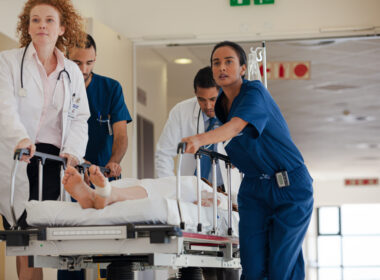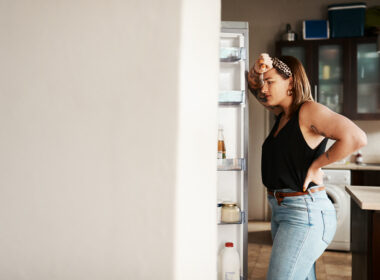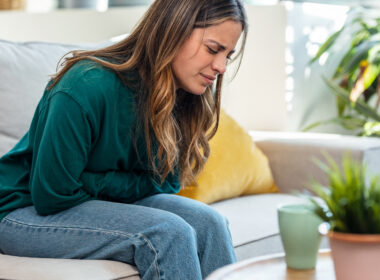Muchos padres se resisten a introducir a sus hijas en el concepto de ciclo menstrual. Les preocupa que la información les resulte abrumadora (para ellos mismos...). y ), que a sus hijas les dará “asco” o miedo la menstruación y el moco cervical, o que no tienen conocimientos suficientes para poder hablar con ellas sobre este tema tan importante. En otras palabras, muchos padres piensan que es un tema que es mejor dejar en manos de “los expertos”, es decir, de los profesores de educación sexual del colegio o de mujeres que, como yo, son profesoras del método de conocimiento de la fertilidad (FAM) o de planificación familiar natural (PFN).
Un argumento contra “pasarse la pelota”
Pero los programas escolares de educación sexual suelen no están a la altura de la educación que los adolescentes realmente necesitan y merecen sobre sus cuerpos. Y el hecho de que alguien pueda enseñar eficazmente a las parejas de novios un método de PFN no significa que sea la persona adecuada para enseñar a tu hija sobre su cuerpo en proceso de maduración. De hecho, como Instructora de Conocimiento de la Fertilidad, ...pensarías que sería... muy confiado a la hora de iniciar a mi propia hija en la brillantez de su cuerpo femenino, pero ¡piénsalo otra vez!
Los programas escolares de educación sexual no suelen estar a la altura de la educación que los adolescentes realmente necesitan y merecen sobre su cuerpo. Y el hecho de que alguien pueda enseñar eficazmente a las parejas de novios un método de PFN no significa que sea la persona adecuada para enseñar a tu hija sobre su cuerpo en proceso de maduración.
Aunque tengo la “cabeza bien amueblada”, también sé que acoger a las jóvenes en su feminidad madura es mucho más que darles meros datos. Sí, quiero que mis hijas tengan un lenguaje anatómicamente apropiado, que entiendan los porqués y los cómos de su flujo menstrual y que reconozcan sus moco cervical (también conocido como “flujo blanco”) como signo de salud.
Pero también quiero más.
Precisamente por eso, los padres -cuando están bien preparados- son las personas más indicadas para educar a sus hijas sobre sus ciclos y para regalarles la alfabetización corporal. Me explico.
Quiero más para mis hijas
Al pensar en educar a mis cuatro hijas sobre sus cuerpos, me di cuenta de que, fundamentalmente, quería que supieran que sus cuerpos son Bien. Quería que experimentaran asombro y admiración ante los ciclos que tocarán la melodía de fondo durante su juventud y más allá. Que supieran que sus ciclos son parte integrante de su creación, fundamentales para su desarrollo. su salud y bienestar generales, y realmente su “quinto signo vital."
Como madre, también sabía que quería ayudarles a utilizar los gráficos de sus ciclos para determinar si había algún problema de salud subyacente en caso de que empezaran a tener ciclos dolorosos u otros síntomas. Quería poder ayudarles a controlar si sus periodos eran ganando una apariencia de regularidad durante el primer o segundo año de ciclismo. (¡que es lo normal en los preadolescentes y adolescentes que acaban de empezar a pedalear!), para que no se dejen engañar por la falsa idea de que la menstruación es inmediatamente regular, y se les anima a tomar anticonceptivos como resultado.
Lo que más quería era que mis hijas supieran que ningún tema estaba prohibido, que podían acudir a la escuela. me con cualquier pregunta que pudieran tener sobre su cuerpo, y que les respondería de la forma más abierta y honesta posible.
Lo que más quería era que mis hijas supieran que ningún tema estaba prohibido, que podían acudir a la escuela. me con cualquier pregunta que pudieran tener sobre su cuerpo, y que les respondería de la forma más abierta y honesta posible.
Cómo quería que la experiencia de la pubertad fuera diferente para mis hijas
Por mi propia experiencia con la pubertad y la adolescencia, sabía que la afectivo Las experiencias de convertirse en una nueva mujer importan más que el mero aprendizaje de los hechos escuetos de la anatomía y la fisiología femeninas. Mi madre, que trazaba su propio ciclo, me preparó bien intelectualmente para la madurez. Cuando tuve mi primera regla, repasamos juntas un diagrama de la anatomía femenina para ayudarme a visualizar mejor lo que ocurría en mi propio cuerpo.
Pero lo que más recuerdo, y lo que aún recuerdo, es la evidente incomodidad de mi madre cuando empezó a abordar el tema del encuentro entre el esperma y el óvulo. La conversación terminó enseguida, de una manera que me hizo sentir como si yo hubiera hecho algo mal (¡seguro que no era la intención de mi madre!). Pero, como ocurre con muchos padres que intentan abordar estos temas con sus hijos sin preparación, el pánico se apoderó de mi madre en el momento en que ciertos temas relacionados con el sexo y la reproducción se hicieron patentes.
En otras palabras, sabía por experiencia propia el enorme impacto que tienen los padres en la forma en que sus hijas piensan y sienten sobre estos temas. Por lo tanto, estaba decidida a estar preparada con un enfoque adecuado a la edad de la conversación y, sobre todo, a estar atenta a las opiniones de los padres. timbre, tono y calidad emocional dentro de la cual me adentraría en estas experiencias con mis propias hijas. Mi esperanza es (¡y siempre será!) que mis hijas abracen sus cuerpos femeninos maduros como algo bueno a través del impacto de mi propia confianza, alegría y entusiasmo.
Mi esperanza es (¡y siempre será!) que mis hijas abracen sus cuerpos femeninos maduros como buenos a través del impacto de mi propia confianza, alegría y entusiasmo.
Una discapacidad intelectual añade otra capa a la conversación en torno a la alfabetización corporal
En el caso de mi hija mayor, su discapacidad intelectual (DI) ha añadido una dimensión completamente distinta a nuestras conversaciones sobre cómo ayudarla en la transición a la pubertad y más allá.
Se ha observado que a las mujeres con DI se les prescribe la inyección anticonceptiva Depo-Provera en tasas significativamente más altas que a la población general (sí, la misma inyección anticonceptiva que se actualmente vinculado a tumores cerebrales en importantes demandas en Estados Unidos), y que estas mujeres a menudo experimentan una asombrosa falta de autonomía en torno a las decisiones anticonceptivas-.y a muchas se les anima o se les obliga a tomar anticonceptivos., aunque no sean sexualmente activas [1].
Asimismo, las mujeres con DI se someten a esterilizaciones permanentes en forma de ligaduras de trompas e histerectomías (sin indicación médica) en mayor proporción que la población general. De hecho, en un estudio se observó que las mujeres con DI tenían 1,5 veces más probabilidades de someterse a una ligadura de trompas y 2,5 veces más probabilidades de someterse a una histerectomía que sus homólogas con capacidades normales, y tienden a someterse a estas intervenciones a una edad mucho más temprana: la edad media de la histerectomía para las mujeres con DI es de tan sólo 27 años [2].
Conocer las realidades del mundo en el que vivimos y ser consciente de las necesidades únicas de mi hija mayor han hecho que sea aún más apremiante fomentar su transición a la feminidad de una forma respetuosa, empoderadora y positiva.
Aquí es precisamente donde mi experiencia personal se cruza con el programa de alfabetización corporal de Natural Womanhood, Period Genius.
Conocer las realidades del mundo en el que vivimos y ser consciente de las necesidades únicas de mi hija mayor han hecho que sea aún más apremiante fomentar su transición a la feminidad de una manera respetuosa, empoderadora y positiva. Aquí es precisamente donde mi experiencia personal se cruza con el programa de alfabetización corporal de Natural Womanhood, Period Genius.
Cómo el programa Period Genius de Natural Womanhood me proporcionó lo que necesitaba para que mi hija mayor aprender sobre su ciclo
Debido a su discapacidad intelectual, mi preciosa hija mayor necesita que el aprendizaje se divida en trozos pequeños y digeribles. Con sus diez módulos breves, Period Genius ofrece conceptos en dosis “justas” para mi hija.
Mi hija también necesita que el aprendizaje sea atractivo e ilustrado. Period Genius, una serie de vídeos producidos por profesionales, proporcionó a mi hija los elementos visuales que necesitaba para que el aprendizaje tuviera sentido.
Mi hija mayor también es lenta para hablar de sus propias experiencias, pero las preguntas de debate después de cada módulo de aprendizaje de Period Genius abrieron conversaciones que no creo que hubiéramos tenido de otro modo.
Cómo Period Genius consiguió lo que yo quería para que mi hija mayor se sintiera bien con su ciclo.
¿Y qué hay de todos esos deseos que tenía sobre cómo quería que mi hija siente sobre la maduración de su cuerpo femenino? Aunque, en última instancia, sus sentimientos están fuera de mi control, Period Genius nos ayudó a preparar el entorno de mi hija para que, cuando llegara su primera hemorragia, la experiencia fuera recibida con positividad y entusiasmo.
Aunque en última instancia sus sentimientos están fuera de mi control, Period Genius nos ayudó a preparar el entorno de mi hija para que, cuando llegara su primera hemorragia, la experiencia fuera recibida con positividad y emoción.
(Si quieres saber más sobre mi experiencia preparando a mi hija con necesidades especiales para la pubertad, echa un vistazo a mi entrevista en el podcast Hormone Genius aquí.)
Todas las jóvenes merecen ser acogidas en su “feminidad natural”
Si usted es padre de una hija preadolescente o adolescente que mostrar signos de pubertad-o que ya ha tenido su primera menstruación- apuesto a que mucho de esto te suena familiar o te resuena.
Al fin y al cabo, aunque sea neuroatípica, es probable que las necesidades de mi hija no sean tan diferentes de las de otras niñas de su edad. Y como padre de tu hija, eres es la que está mejor preparada para entender cómo, cuándo y con qué actitud debe tener lugar esta importante educación y las conversaciones posteriores para que ella las reciba y participe en ellas de forma positiva y abierta. Y el mejor momento para empezar a tener estas conversaciones es mucho antes de su primera regla, para que esté preparada y para que tú también lo estés (aunque nunca es demasiado tarde para abrir las líneas de comunicación si tu hija ya va en bici).
Según un informe, Casi la mitad de las niñas no tienen ni idea de lo que ocurre cuando les viene la primera regla. Para estas niñas, la menstruación está rodeada de miedo y vergüenza, algo que ningún padre quiere para su hija. Y la buena noticia es que es algo totalmente evitable con una educación positiva, adecuada a la edad y respetuosa con la menstruación, como la que se ofrece en Period Genius.
Según un informe, casi la mitad de las niñas no tienen ni idea de lo que ocurre cuando les viene la primera regla. Para ellas, la menstruación está rodeada de miedo y vergüenza, algo que ningún padre quiere para su hija. Y la buena noticia es que es algo totalmente evitable con una educación positiva, adecuada a la edad y respetuosa con la menstruación, como la que se ofrece en Period Genius.
¿Quieres saber más sobre Period Genius?
Si está interesado en obtener más información sobre el programa Period Genius para su(s) hija(s), le animo a que pulse aquí.
Y si quieres desempeñar un papel en el establecimiento de las bases para que las mujeres jóvenes de tu comunidad abracen y celebren su feminidad natural, por favor considera el impacto que puedes tener asociándote con Natural Womanhood a través de una Licencia de Grupo Period Genius.
¿Tiene alguna pregunta? ¡Charlemos! Envía un correo electrónico a Jackie Aguilar, creadora de Period Genius (jackie@naturalwomanhood.org), para concertar una cita hoy mismo.







